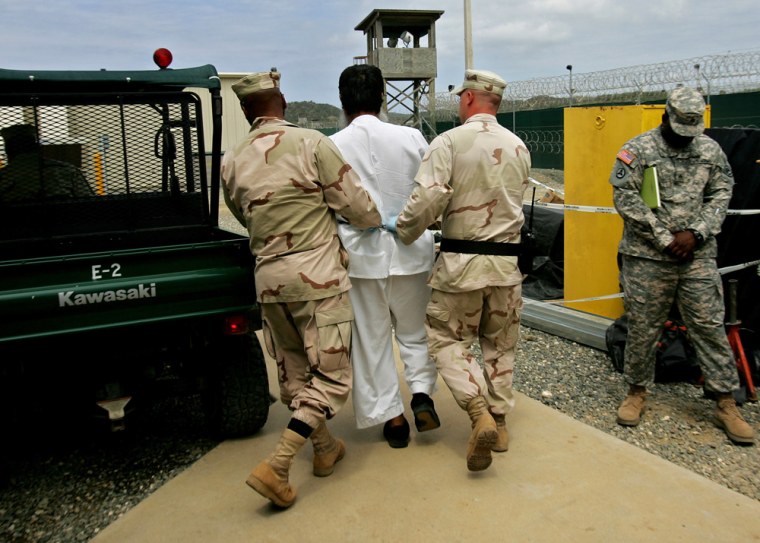President-elect Barack Obama is preparing to issue an executive order his first week in office — and perhaps his first day — to close the U.S. military prison at Guantanamo Bay, according to two presidential transition team advisers.
It's unlikely the detention facility at the Navy base in Cuba will be closed anytime soon. In an interview last weekend, Obama said it would be "a challenge" to close it even within the first 100 days of his administration.
But the order, which one adviser said could be issued as early as Jan. 20, would start the process of deciding what to do with the estimated 250 al-Qaida and Taliban suspects and potential witnesses who are being held there. Most have not been charged with a crime.
The Guantanamo directive would be one of a series of executive orders Obama is planning to issue shortly after he takes office next Tuesday, according to the two advisers. Also expected is an executive order about certain interrogation methods, but details were not immediately available Monday.
The advisers spoke on condition of anonymity because they were not authorized to speak publicly about the orders that have not yet been finalized.
Obama transition team spokeswoman Brooke Anderson declined comment Monday.
The two advisers said the executive order will direct the new administration to look at each of the cases of the Guantanamo detainees to see whether they can be released or if they should still be held — and if so, where.
Many of the Guantanamo detainees are cleared for release, and others could be sent back to their native countries and held there. But many nations have resisted Bush administration efforts to repatriate the prisoners back home. Both Obama advisers said it's hoped that nations that had initially resisted taking detainees will be more willing to do so after dealing with the new administration.
What remains the thorniest issue for Obama, the advisers said, is what to do with the rest of the prisoners — including at least 15 so-called "high value detainees" considered among the most dangerous there.
Detainees held on U.S. soil would have certain legal rights that they were not entitled to while imprisoned in Cuba. It's also not clear if they would face trial through the current military tribunal system, or in federal civilian courts, or though a to-be-developed legal system that would mark a hybrid of the two.
Where to imprison the detainees also is a problem.
Obama promised during the presidential campaign to shut Guantanamo, endearing him to constitutional law experts, civil libertarians and other critics who called the Bush administration detentions a violation of international law.
But he acknowledged in an interview Sunday that the process of closing the prison would be harder and longer than initially thought.
"That's a challenge," Obama said on ABC's "This Week." "I think it's going to take some time and our legal teams are working in consultation with our national security apparatus as we speak to help design exactly what we need to do.
"But I don't want to be ambiguous about this," he said. "We are going to close Guantanamo and we are going to make sure that the procedures we set up are ones that abide by our constitution."
President George W. Bush established military tribunals to prosecute detainees at Guantanamo. He also supports closing the prison, but strongly opposes bringing prisoners to the United States.
Lawmakers have moved to block transfer of the detainees to at least two potential and frequently discussed military facilities: an Army prison at Fr. Leavenworth, Kan., and a Navy brig in Charleston, S.C. A Marine Corps prison at Camp Pendleton in Southern California also is under consideration, a Pentagon official said.
Sen. Sam Brownback, R-Kan., said Monday that "it's hard to show why terror suspects should be housed in Kansas."
"If the holding facility at Guantanamo Bay is closed, a new facility should be built, designed specifically to handle detainees," Brownback said in a statement.
A Pentagon team also has been looking at how to shut Guantanamo and move its detainees but spokesman Bryan Whitman did not immediately know Monday whether it was completed.
The executive order marks only a first step at what is likely to be a long legal process. Still, American Civil Liberties Union legislative director Caroline Fredrickson called "extremely meaningful" even if the Guantanamo prison can't be closed immediately.
"It's clear that there is a process of time that will be necessary to close it properly, to make sure that human rights and respected and security is protected," Fredrickson said. "But the fact that it's set in motion is extremely good news."
